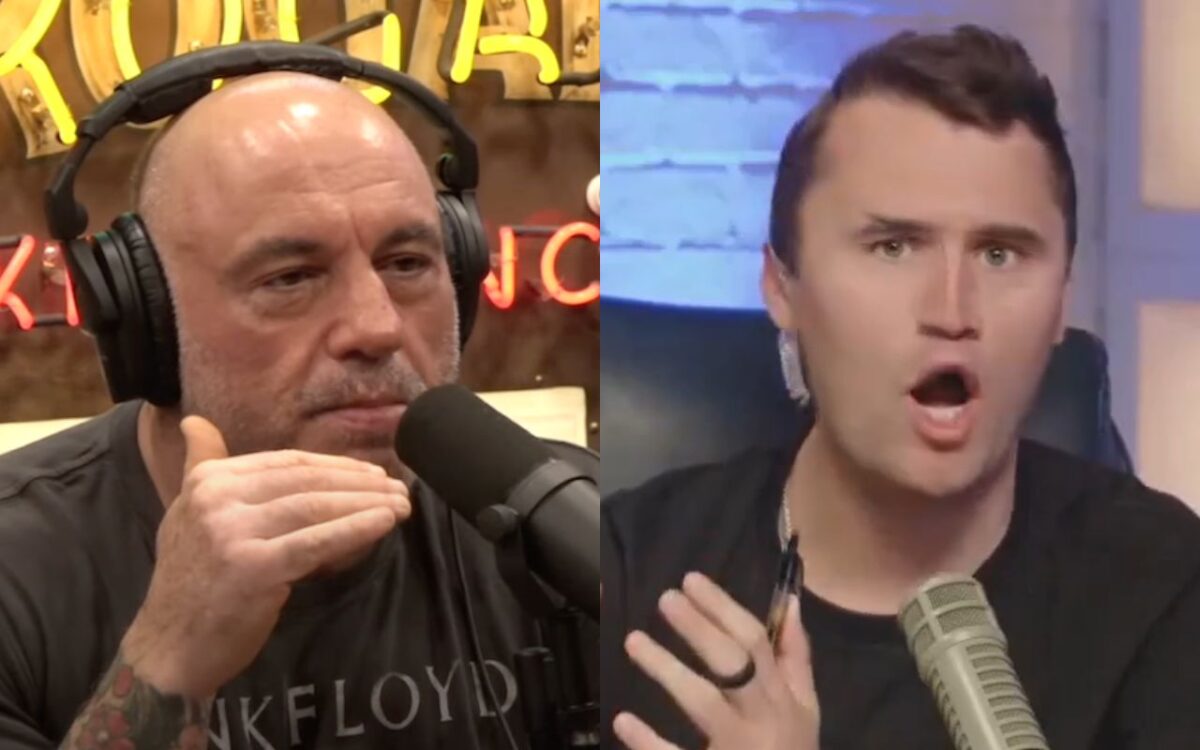Top Podcasts in America Are Preemptively Pushing 2024 Election Fraud Claims: Report

Screenshot via Joe Rogan Experience; Screenshot via The Charlie Kirk Show
A new report by The Washington Post outlined an ongoing talking point in right-wing podcasts: election fraud. But not existing election fraud — future election fraud.
In the story published on Thursday, Cat Zakrzewski, Naomi Nix, and Jeremy B. Merrill dug through transcripts for over 100 popular podcasts that have been produced and streamed over the past year and found that 26 “nationally prominent programs” — including The Joe Rogan Experience, The Ben Shapiro Show, The Charlie Kirk Show, and The Dan Bongino Show — have given significant air time to push baseless claims that the 2024 election will be rigged:
Some of the hosts or their guests have echoed Republican presidential candidate Donald Trump’s claims that Democrats are preparing to steal the election. Experts say the baseless allegations could prime listeners not to accept the results if the former president loses the razor-tight race. During October appearances on the Shapiro and Rogan shows, Trump said that Democrats were cheating and that the media was interfering with the election.
While Rogan provided little pushback when he hosted Trump in October, he did ask Trump when he was going to produce evidence of fraud related to the 2020 election. Trump never gave him an answer.
Former President Trump baselessly claimed on Truth Social on Wednesday that Pennsylvania was already “cheating.” It was one of several claims that he has made — without evidence — that the 2024 election was not going to be legitimate. The Washington Post reported that podcasts are produced with little to no oversight, making them a “safe space” to push falsehoods to a massive audience without being subject to factchecking:
Podcasts, whose fast-moving audio format has proved challenging for tech companies and researchers to monitor, can provide “a safe space” for those airing election-fraud narratives, said Valerie Wirtschafter, a fellow at the Brookings Institution. The shows are an especially impactful vehicle for falsehoods and conspiracy theories because hosts foster intimate, trusted relationships with their listeners, who regularly tune in during their commutes or while doing chores around their homes, she said.
Four years ago, Trump allies such as Stephen K. Bannon and Rudy Giuliani used podcasts to put out claims of election fraud ahead of the Jan. 6, 2021, attack on the U.S. Capitol. Wirtschafter said she worried the shows could provide a similar avenue again.
“These aren’t fringe voices at the end of the day anymore,” she said. “It’s a really prominent medium that should not be allowed to escape this conversation the way it did in 2020. The microphone is bigger, the audience is larger and the trust is even deeper.”
Despite repeated claims pushed by Trump and his podcast host supporters, there was no evidence of widespread election fraud related to the 2020 election, which Trump lost to President Joe Biden.






